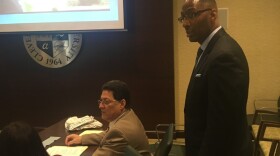Cleveland City Councilman Jeff Johnson is proposing a new law to track and reduce lead hazards in the city. The ordinance would affect rental properties, schools and other public buildings, and private homes built before 1978.
The proposal also includes grants through city and non-profit organizations to pay for inspectors to check the buildings. The grants would pay part of the inspection cost for landlords and all of it for private homeowners.
Johnson, who is running for mayor, says lead-paint poisoning is one of the most important issues in the city.
“Children that have been infected with poison from lead in the city of Cleveland is twice the number of children that got lead poisoning in Flint, Michigan. When you compare that, given the national outcry of what happened in Flint, what we have in Cleveland is a quiet crisis.”
Johnson says his goal is to establish a registry of lead- safe homes that residents could rely on. He plans to introduce the ordinance at next month’s city council meeting.
The ordinance would go further than Toledo, which has one of the toughest inspection ordinances in the state.
Shannon Lands with the Toledo-Lucas County Health Department says both cities share a reason to be concerned for their children.
“We get cases from the Ohio Department of Health of kids who are already lead poisoned. And when we were trying to enact and pursue this ordinance we wanted to do it with a proactive approach to where we could lower the number of children who have lead poisoning.”
Under Toledo’s ordinance, all affected buildings must be checked by 2020. Some of those buildings must meet the qualifications by next year. Cleveland's ordinance would be fulling in effect in 2021.





